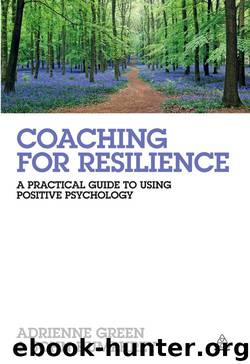Coaching for Resilience: A Practical Guide to Using Positive Psychology by Adrienne Green & John Humphrey

Author:Adrienne Green & John Humphrey [Green, Adrienne]
Language: eng
Format: azw3
Publisher: Kogan Page
Published: 2012-09-03T04:00:00+00:00
* * *
Developing the skills of empathetic assertiveness
We’ve been talking a lot about communication. However, this book is about building resilience. We introduce the concept of empathetic assertiveness into our KEYS because we know how stress can arise through lack of assertiveness and the damage that stress can do to a person’s resilience. You need to work to develop the skills of empathetic assertiveness so you can protect yourself from stress and maintain your own personal resilience.
Although we have presented some ideas on the qualities and skills involved in behaving assertively, unfortunately we don’t have space in this book to go into these in very specific detail. That’s another course and a different book. If you’ve realized through reading this chapter that you need to learn more about how to become assertive, then we would recommend you take a look at some of the books from our reading list, or find a course or workshop that you can attend. Assertiveness skills can be so powerful and life-transforming that it would be well worth the effort.
Having said that, we would like to give you our top tip for assertive communication to get you started.
Top tip for behaving assertively: use empathy first
Before you make any assertive statement about yourself, put yourself in the other person’s shoes and say something that you sense or know about them. With this approach you will find it much easier to do the things that you might find most difficult, such as challenging someone else’s behaviour and saying ‘no’. It will be easier for you because once the other person feels that their position has been respected they will be able to accept yours more readily and easily.
Always start with something about the other person = ‘you’:
‘I can see/hear/sense/understand what you say/feel/think/need...
Then say what you need to say about yourself = ‘I’:
However, I feel/think/need...’
Let’s take a look at a few examples of how this might work in practice. We’ve underlined the empathetic ‘you’ response and the assertive ‘I’ message.
1. Challenging someone else’s passive or passive-aggressive behaviour
‘I know you sometimes find it difficult to say what you want, and although you’ve agreed to... I can see you’re not very happy about it. I’d really prefer it if you could tell me what you really want, then I’ll know where I stand and there’ll be no bad feelings between us. Ok?’
‘Maybe you’re telling me nothing’s wrong because you don’t want to upset me or cause an argument. Only, the thing is, I can tell that you’re angry/unhappy/anxious and I’d honestly prefer to know what’s troubling you.’
‘You’re telling me you don’t mind if I do/don’t do... and I think that might be because you don’t want to put pressure on me. I can hear from your voice though that you really do mind. Please tell me how you really feel and I’ll be honest about what I can and can’t do.’
All of these examples demonstrate assertiveness on your part, and also empower the other person to abandon their passive or passive-aggressive approach and become more honest with you too.
Download
This site does not store any files on its server. We only index and link to content provided by other sites. Please contact the content providers to delete copyright contents if any and email us, we'll remove relevant links or contents immediately.
| Administration & Medicine Economics | Allied Health Professions |
| Basic Sciences | Dentistry |
| History | Medical Informatics |
| Medicine | Nursing |
| Pharmacology | Psychology |
| Research | Veterinary Medicine |
The Art of Thinking Clearly by Rolf Dobelli(10399)
The 5 Love Languages: The Secret to Love That Lasts by Gary Chapman(9766)
Mindhunter: Inside the FBI's Elite Serial Crime Unit by John E. Douglas & Mark Olshaker(9305)
Becoming Supernatural by Dr. Joe Dispenza(8190)
Nudge - Improving Decisions about Health, Wealth, and Happiness by Thaler Sunstein(7684)
The Road Less Traveled by M. Scott Peck(7578)
Mastermind: How to Think Like Sherlock Holmes by Maria Konnikova(7309)
Enlightenment Now: The Case for Reason, Science, Humanism, and Progress by Steven Pinker(7300)
Win Bigly by Scott Adams(7178)
The Way of Zen by Alan W. Watts(6584)
Factfulness: Ten Reasons We're Wrong About the World – and Why Things Are Better Than You Think by Hans Rosling(4727)
The State of Affairs by Esther Perel(4707)
Gerald's Game by Stephen King(4630)
Man's Search for Meaning by Viktor Frankl(4561)
The Confidence Code by Katty Kay(4240)
Thinking in Bets by Annie Duke(4210)
The Healing Self by Deepak Chopra(3562)
Hidden Persuasion: 33 psychological influence techniques in advertising by Marc Andrews & Matthijs van Leeuwen & Rick van Baaren(3538)
The Worm at the Core by Sheldon Solomon(3474)
